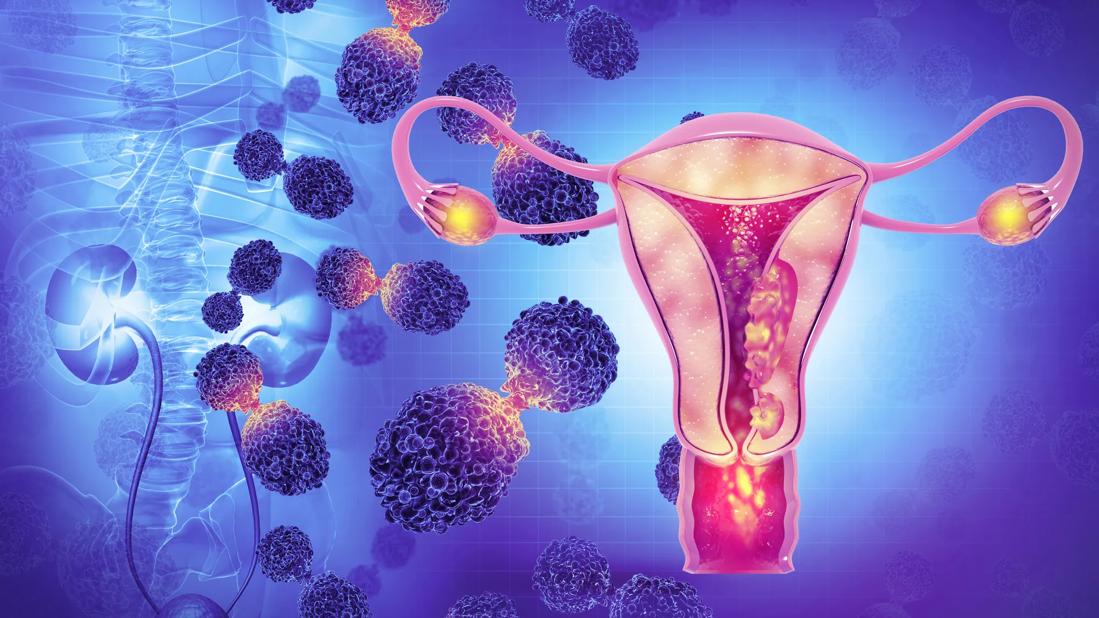Study showed that regimen was well-tolerated in cohort with aggressive carcinoma

A limited study of Cleveland Clinic patients with advanced uterine serous carcinoma (USC), a rare and aggressive form of endometrial cancer, suggests that a therapy commonly used to treat ovarian cancer may offer a novel application for USC.
The study, published in Gynecologic Oncology Reports, examined outcomes for seven women who received hyperthermic intraperitoneal chemotherapy (HIPEC) during interval debulking surgery (IDS) between 2014 and 2020. The patients had received an initial diagnosis of ovarian cancer, for which the IDS/HIPEC therapy was undertaken. After surgery pathology confirmed the primary cancer to be USC.
While HIPEC with IDS is not standard for patients with USC, the study outcomes suggest that further research is warranted to determine whether the therapy holds promise for USC patients, says Roberto Vargas, MD, Cleveland Clinic gynecologic oncologist and a member of the research team, along with first author Laura M. Chambers, MD.
Advertisement
Cleveland Clinic is a non-profit academic medical center. Advertising on our site helps support our mission. We do not endorse non-Cleveland Clinic products or services. Policy
“The reality is that endometrial cancer is becoming more common, and certain types of endometrial cancer are prone to being found in the advanced stages,” says Dr. Vargas. “Our treatments are not as effective for advanced endometrial cancer as they are for advanced ovarian cancer, so it’s important to try to figure out if certain modalities that we use in ovarian cancer might help in endometrial cancer.”
Results showed that IDS with HIPEC was associated with favorable rates of overall survival (OS) and progressive-free survival (PFS). Median PFS was 14 months; median OS was 27. The women also experienced acceptable levels of toxicity following surgery with HIPEC.
Although USC accounts for only about 10% of uterine cancers, it is responsible for nearly 40% of endometrial cancer deaths. Studies demonstrate an OS rate of 16 to 20 months among USC patients, and those who are Black are more likely to suffer poor outcomes.
Primary cytoreductive surgery (PCS) is standard treatment for USC, although in some cases neoadjuvant chemotherapy followed by interval surgery may be pursued. No statistical difference has been demonstrated regarding survival rates between the two approaches, although studies comparing approaches have been limited to retrospective analyses. In ovarian cancer, studies show that those who undergo interval debulking surgery with HIPEC in the middle of their chemotherapy regimen benefit from an increase in OS of about 11.8 months compared to those who do not receive HIPEC.
Advertisement
HIPEC, introduced at Cleveland Clinic in 2009, is a generally well tolerated procedure. The process begins just after surgical efforts are complete. Heated chemotherapy is circulated in the closed abdominal cavity for about 90 minutes, then the abdomen is rinsed. While some of the details about why HIPEC is effective remain unclear, hyperthermia is known to increase the penetration of chemotherapy into tissue. It might also impair the ability of cancer cells to repair their own DNA, Dr. Vargas adds.
“Patients overall do very well after HIPEC surgery for gynecologic malignancies,” he says. “Dr. Chambers, the first author of this manuscript, has helped develop multiple articles on best practices and patient selection for this procedure. Given our significant experience with this technique and the protocols that we have in place, we can routinely keep our HIPEC patients out of the ICU.”
All seven of the patients whose cases were reviewed were believed to have had advanced ovarian cancer at the time of IDS plus HIPEC, before final pathology confirmed USC. The HIPEC regimen was cisplatin (100 mg/m2) with or without paclitaxel (135–175 mg/m2), administered in a normal saline perfusate at a goal temperature of 41-43C degrees for 90 minutes.
Among members of the cohort, the median age was 64.5. Six had Stage IV disease. Five patients had MMR proficient (n = 5, 71.4%), p53 mutant (n = 6, 85.1%) USC. The median CA125 before surgery was 24.0U/mL (IQR 16.0, 60.0). All patients underwent hysterectomy and five had no gross residual disease.
Advertisement
Median progression-free survival was 14 months. Median overall survival was 27 months.
“The efficacy of HIPEC and endometrial cancer needs to be studied in a randomized trial as it was for ovarian cancer, given that USC may have a different biologic response to HIPEC than ovarian cancer,” says Dr. Vargas. “That said, in our retrospective, small-sample-size study, patients had a favorable progression-free survival and overall survival that were comparable to other studies of neoadjuvant chemotherapy and endometrial cancer.”
Advertisement
Advertisement

Uterine transposition cleared the field for radiation therapy

ACOG-informed guidance considers mothers and babies

Prolapse surgery need not automatically mean hysterectomy

Artesunate ointment shows promise as a non-surgical alternative

New guidelines update recommendations

Two blood tests improve risk in assessment after ovarian ultrasound

Recent research underscores association between BV and sexual activity

Psychological care can be a crucial component of medical treatment